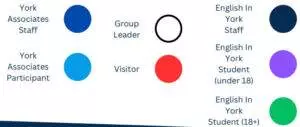In order to keep our school running smoothly and ensure that all students are safe and happy, we have certain policies and procedures in place.

York Associates and English In York strive to give our students and course participants a rewarding international experience.
If you are not satisfied with any part of your stay with us, including with the quality of the teaching you are receiving, we will always welcome the opportunity to resolve your concerns. To raise a complaint, you should follow the procedure given here. The sooner you raise an issue which you feel dissatisfied about, the sooner we will be able to take action to deal with it.
Problems with your course
Problems with your accommodation, or other issues
If you remain dissatisfied, your complaint will be escalated to the School Director, Jonathan Raine ([email protected]) for his consideration and action.
If, after this, you are not happy with how your complaint has been dealt with, you can contact one of the following organisations for help. (you must give us an opportunity to resolve your complaint first).
Please see below information from EnglishUK about how to raise your complaint with them:
If you are studying English at an English UK member centre, there is a system for dealing with complaints. You must start by talking to someone at your centre. If you are still unhappy after talking to your centre, you can email EnglishUK and explain the problem. We will talk to you and your English language centre to try to find a solution that everyone is happy with. Most complaints are solved at this stage.
Please write your email in English and send it to [email protected]. The email must be sent by you, not your company or agent.
If you feel the problem has not been solved, we will send your complaint to an independent person called an ombudsman. The ombudsman will listen to both sides and decide what should happen. They will look at all the information about your complaint, including everything you and your centre have written to each other about it. They may also ask you and your centre some questions. Your language centre must act on what the ombudsman says.
You can usually use this complaint system if you are studying English at an English UK member centre. In very rare cases, you may be studying on a course at an English UK member centre which is not accredited. If so, you will not be able to use this complaints system. We usually only act on complaints from individual students. We can take complaints from agents if a booked group has experienced a problem, but we have the right to ask for complaints from individual students instead.
You can see more information about the EnglishUK complaints procedure by going to:
https://www.englishuk.com/complaints.
Please see below information from The British Council about how to raise your complaint with
them:
Accreditation UK is committed to following up complaints about accredited organisations. Many of the accredited centres are members of EnglishUK, who are our partners in the
Scheme. If your complaint is about a school or college that is a member we will pass your complaint to them for them to investigate.
If you have made your complaint to the centre and it has not been resolved, please send us by
email:
Email your complaints to: [email protected]
Please note that the British Council is unable to follow up complaints about non-accredited organisations, or complaints from non-students concerning accredited centres (except in cases where there is a clear threat to student welfare).
You can see more information about the British Council complaints procedure by going to:
https://www.britishcouncil.org/contact/complaints.
If you have any questions about the content of this policy, or any of the steps in the complaints procedure, please ask your Teacher or any member of staff, who will be happy to help you.
York Associates is committed to ensuring the protection and welfare of all students, staff and visitors. All students, staff and visitors have an equal right to a safe environment to learn, teach and visit regardless of age, gender, ability, culture, socioeconomic status, race, language, religion or sexual identity.
YA prides ourselves on our informal environment, facilitating a student-led, adult approach to education. However, safety of our students, staff and visitors is a key priority and lanyards play a key role in keeping all members of the community safe at all times. Our use of identity lanyards allows staff and students to ascertain at a glance whether persons on site are members of the school community. This policy imposes a duty on all members of the community to immediately report any persons not wearing their lanyard to reception on site.
Wearing a lanyard with ID card around the neck at all times on school premises is one of our rules. It is critical for the safety of everyone that all members of the school community fully commit to this rule. The wearing of the lanyard and ID card is compulsory and must be worn at all times when on the premises. The lanyard should be worn around the neck, on the front of the body and on the outermost piece of clothing. If an individual is unable to wear the lanyard around their neck for medical, physical or other reasons, they will be provided with an alternative identifying mechanism.
Identifying lanyards

At York Associates, we aim to create an environment where everyone feels welcome and able to fulfil their potential. Everyone has a right to study and work in a safe and non-judgmental environment. We strive to create an inclusive trans-friendly culture, workplace and learning environment, which is free from discrimination, harassment or victimisation. All transgender (hereafter ‘trans’) people, people perceived to be trans, and people associated with trans people such as partners, spouses and other family members, are treated with dignity and respect. Our inclusive environment demonstrates respect and dignity for trans people, in terms of: gender identity; right to study and work; use of our facilities; name and personal identity; privacy and confidentiality.
We anticipate and respond positively to the needs of prospective, current and former students in relation to gender identity issues, providing a professional and consistent service so that all trans members of our community feel welcome, safe, valued and supported to achieve their potential as a member of our community. This policy applies to (but is not limited to) admissions processes; teaching provision; the provision of student support, school accommodation and other school facilities; health and safety policies; personal conduct; student complaints and disciplinary procedures.
Transgender Students
We recognise that there can be differences between sex assigned at birth and gender identity/expression and we at no time discriminate or victimise as a result of the gender in which a student presents. We offer active support throughout any transition process. Despite increasing public awareness of trans issues, a student may be worried about how we or fellow students will respond.
Students who feel unsupported may:
Each individual trans experience will vary depending on a range of factors. It is not necessary for an individual to be under medical supervision, or to undertake reassignment surgery, to benefit from the legal protection under the Equality Act 2010. Protection begins once a trans person first indicates an intention to transition.
Bullying & Harassment
We do not accept any form of bullying or harassment by, or of, members of school staff or students. It is the right of every individual to choose whether to be open about their gender identity and history. To ‘out’ someone, whether staff or student, without their permission may amount to a form of harassment and possibly a criminal offence.
Appropriate Language
Whilst all staff are expected to be sensitive and supportive to trans students and to ensure that they are not discriminated against or harassed, it is recognised that not everybody in the school community will be aware of the most appropriate, contemporary language to use in relation to trans identities. We consider the following points as the minimal level of good practice for all staff to adhere to:
Student Records
York Associates student records usually recognise students by the name and gender given in their passport or other identity document. When we are advised that a student’s name and gender identity does not match that given in their passport, we will update this record to give the students preferred name and gender. The individual’s official, legal name and gender will be recorded in a confidential notes section of their student record, for legal and immigration purposes.
Attendance certificates and reports will be issued using the student’s preferred name and gender, unless the individual specifically requests otherwise. There are some exceptions; for example where a document is required for official purposes, including immigration or other legal processes, it will be issued using the name and gender given on official identify documents.
Homestay Accommodation and School Facilities
In school, there is a gender neutral toilet located on floor -1, which trans students may prefer to use. However, trans students are not restricted to using this facility, and are free to use the male or female toilets according to their preference.
Students who require homestay accommodation will usually have their own individual bedroom, unless they are travelling in a group, where they may be sharing with one or more other students. We will accommodate trans students in a single occupancy room wherever possible. Where shared accommodation is offered, trans students will be accommodated with other students of their chosen gender.
Click here to see our Modern Slavery Policy.
Our Recruitment policy can be found here.
Our Recruitment of Ex-Offenders policy can be found here.
Our Student Visa Policy can be found here.
Please fill in your details so we can contact you once you have taken a look at our brochure.